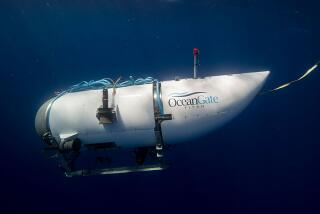Breaking the Office Chains
- Share via
Gentle Readers:
Karen Stephenson knows a good adventure when she sees one, having survived hair-raising trips into deserts and jungles as an anthropologist. After re-crafting herself as a “corporate anthropologist,” the Dallas-born Stephenson now ventures into the equally untamed venues of academia, as a professor at UCLA’s Anderson School, and of corporate America, as a consultant to executives of high-tech, manufacturing, banking and other companies. As testament to a pugnacious nature, her office sports a sign: “Don’t mess with Texas.”
Cathy, Stephenson’s challenger on the issue of workplace adventure, has not aged a bit since her debut as a comic strip character in newspapers nationwide in 1976. Since then, she has served as a sort of vulnerable Everywoman for many of the nation’s single career women--revealing her travails with bosses, boyfriends, dieting and department store fitting rooms. As Cathy aficionados know, an adventure can be as simple as trying on a bikini. Her alter ego, by the way, is cartoonist Cathy Guisewite, who runs her Cathy empire from a workshop in Studio City.
Ms. Work Wise
*
Q. What does adventure mean to you?
Stephenson: Adventure means going where no man has gone before. Real adventure is going where no woman has gone before. Adventure is the reward itself for many.
Cathy: Adventure is bravery in the face of the unknown. (For example, answering the phone in the office when the only possibility is that the person on the other end is calling about something you haven’t done yet.) Adventure is calculated risk-taking. (How many fat-free muffins can you eat at the client breakfast meeting without losing the button on your power suit?) Adventure is panic management. (You have a 20-minute rush-hour commute in which to write your presentation, put on your makeup, re-hem the right half of your skirt and explain to your mother via cell phone why you haven’t called in a week.)
*
W. What type of personality is best suited to adventure?
Stephenson: A person who loves adventure and who actually engages in it is usually a risk-taker. There is a difference between a reckless and a wise risk-taker, however. Risk-takers are usually innovators or entrepreneurs. You don’t have to start a business to be an entrepreneur--within an organization, you can be an “intrapreneur,” creating new ways of doing things and new things to do.
Cathy: The type of personality best suited to adventure is either type D (delusional) or type O (optimist). But the ideal is that rare breed who is both type D and type O all in one, creating the powerful type DO (delusional optimist), or a real “DOer,” as such people are known in corporate America.
*
Q. The fictional archeologist Indiana Jones became the epitome of an adventurer in the movies. Who are the icons of adventure in corporate America?
Stephenson: Adventurers include Frances Hesselbein (who, as executive director of Girl Scouts USA, galvanized the organization in the 1980s by encouraging low-income and minority girls to join); Herb Kelleher (co-founder and spiritual leader of Southwest Airlines); Ted Turner (visionary behind CNN, which changed TV news coverage forever); former Texas Gov. Ann Richards; Thomas Epley (a chief executive who turned around, among other companies, Technicolor Video Services, the nation’s largest maker of videotapes); and Gordon Mayer (CEO of Alameda, Calif.-based Geoworks, maker of telecommunications software).
Cathy: Here are the true icons. Charlene M.: Assigned to venture alone and unprotected into the dark, terrifying back shelf of the office refrigerator to try to find a carton of unspoiled 2% milk. Mr. Pinkley: Owner and operator of a $5,000 computer, a $6,000 sound system and $3,000 worth of miscellaneous boy gizmos, who gets locked in the copy room by a group of fed-up female employees and told he won’t be let out until he figures out how to refill the paper tray in the copier all by himself. And Marcia D.: With nothing to go on but a message hastily scrawled on an empty artificial sweetener packet, was sent into the “inactive file storage room” and given 17 minutes to locate the middle initial of an old client her boss was attempting to win back by surprising him with a set of monogrammed golf balls.
*
Q. How can an individual make a job seem like an adventure?
Stephenson: Learn the job well so that you can see holes or gaps and figure out ways in which the job could be done better. The adventurer sees the inconsistencies, and these become the opportunities to make a change or suggest a new idea. By their behavior, adventurers point to ways institutions can change. If used strategically, adventurers are the natural scouts for future change. If left on their own, they intuitively seek the weak spots in what is presumed to be the smooth, impenetrable surface of tradition.
The awful irony is that they go bouncing along, pointing to where change can be made, only to be continually rebuffed by the standard-bearers, until finally they can’t stand it anymore and they go scooting off somewhere else. The key for real change, it seems to me, is to keep these risk-takers from taking their good ideas elsewhere. In other words, how does a company capture adventurers without killing them?
Cathy: An individual can make any job seem like an adventure by simply setting even more ludicrously high expectations for himself or herself than are expected by the establishment for which he or she works. For instance, if a certain task always takes three full working days, declare--before an audience--that you will not only complete the task in four hours, but that you will return all of last week’s calls, catch up on all of last month’s correspondence, learn to speak Italian and bring in a fresh loaf of homemade banana nut bread by tomorrow morning. Set a hideous precedent for efficiency one time, and all future assignments are guaranteed to be adventures.
*
Q: Would you recommend a change of job or career as a way of creating adventure?
Stephenson: Changing careers is always an adventure--full of stress, surprises and excitement--a kind of individualized renewal. Adventurers change careers because they get bored.
Cathy: Changing jobs is a quick way to induce the full-body panic associated with adventure but hardly necessary if you follow the guidelines in the answer above for self-generated panic.
*
Q: In adventure, there is risk. That goes for the corporate jungle too. How can one avoid getting burned (at the stake)?
Stephenson: Watch for the risk-averse, “needy,” narcissistic people within an institution. In Texas, there’s a saying that I’d best paraphrase: Two things float to the top--cream and weak people. Adventurers have respect for all kinds of people. They know weakness when they see it and do not judge harshly. They wisely deal with it.
Machiavelli said it even better: It must be remembered that there is nothing more difficult to plan, more doubtful of success, nor more dangerous to manage than the creation of a new system. For the initiator has the enmity of all who would profit by the preservation of the old institution and merely lukewarm defenders in those who would gain by the new one.
Cathy: The best way to avoid getting burned is to erect a small fortress of confusion and chaos around you. Let the papers pile high on your desk. Keep overflowing “in” baskets covering every free inch of non-desk space. Make your office a nightmare to walk into. Make it look as if you have so much to do no one would possibly dare to doubt you. Squelch the first signs of trouble by being able to stick your hand into the heap on your desk and pull out the precise obscure piece of paper the person was looking for.
*
Q: If you can’t change your job, how can you bring adventure into your life outside the workplace?
Stephenson: The best barometer for adventure is to see if you feel uncomfortable in a new situation. If the answer is yes, you’ll probably learn something and it will become a mini adventure. If the corporate jungles aren’t adventuresome enough for you, my suggestion is to go to jungles of the green, leafy variety.
Cathy: If you can’t change your job, or change your attitude about your job, you can bring adventure into your non-work life by using many of the same tactics discussed above. Let your personal correspondence pile up. Don’t return phone calls. Put off sending RSVPs, thank-you notes and birthday cards until you are a writhing mass of guilt and are faced with inventing some brilliant, daring, creative maneuver to salvage all your human relationships from complete ruin. Either that, or go on a blind date now and then.
(BEGIN TEXT OF INFOBOX / INFOGRAPHIC)
CATHY’S ICONS OF ADVENTURE
Charlene M.
Forced to venture into the terrifying depths of the office refrigerator.
*
Mr. Pinkly
Surrounded by angry employees tired of his willful ignorance about office technology.
*
Marcia D.
Sent ona desperate search mission to satisfy her boss’ shallow whim.
(BEGIN TEXT OF INFOBOX / INFOGRAPHIC)
STEPHENSON’S ICONS OF ADVENTURE
Thomasp Epley
Former CEO of Technicolor
*
Ted Turner
Time Warner Inc. vice chairman and CNN founder
*
Herb Kelleher
Co-founder of Southwest Airlines
*
Ann Richards
Fomer Texas governor
More to Read
Sign up for The Wild
We’ll help you find the best places to hike, bike and run, as well as the perfect silent spots for meditation and yoga.
You may occasionally receive promotional content from the Los Angeles Times.







